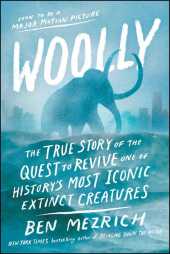 Neuerscheinungen 2017Stand: 2020-02-01 |
Schnellsuche
ISBN/Stichwort/Autor
|
Herderstraße 10
10625 Berlin
Tel.: 030 315 714 16
Fax 030 315 714 14
info@buchspektrum.de |

Ben Mezrich
Woolly
The True Story of the Quest to Revive one of History´s Most Iconic Extinct Creatures
2017. 304 S. 228.6 mm
Verlag/Jahr: SIMON & SCHUSTER US; ATRIA / 37 INK 2017
ISBN: 1-501-17640-4 (1501176404)
Neue ISBN: 978-1-501-17640-1 (9781501176401)
Preis und Lieferzeit: Bitte klicken
"Paced like a thriller...Woolly reanimates history and breathes new life into the narrative of nature." NPR
Woolly CHAPTER ONE
Three thousand years ago
WRANGEL ISLAND.
An eighty-mile-wide swath of volcanic rock, gravel, and permafrost jutting out from the Arctic Ocean, ninety miles off the coast of Siberia, windswept and forbidding. Gray on gray on gray, a forgotten stretch of beach covered in a thick mist, the air heavy with the spray from waves crashing through the loose ice beyond the breakers.
A little after 5:00 a.m., the calf opens his eyes.
Even though his mother is only a few yards away, splayed out against a makeshift nest of dry reeds that she has gathered from the underbrush deeper toward the center of the island, the calf feels strangely alone. The rest of his herd-twenty-five strong, arranged along a matriarchal line that stretches back through three generations-has already begun a short pilgrimage down the coast. Being separated from the bulk of the herd feels unnatural. A mild illness has briefly kept his mother from engaging in the routines of survival on the island, so she´s stayed behind as the herd has set out to search for more sources of drinkable water and grazing. At less than a year old, the calf has remained with his mother, his familial bonds and youthful needs overcoming his developing social instincts. But neither nature nor nurture makes sitting around waiting for her to get back to her full energy any easier.
The calf pushes himself to his feet, the thick muscles in his enormous legs trembling with the effort. His size already makes rising from the ground a bit of an ordeal. He weighed over two hundred pounds at birth and even then stood over three feet tall. Now, though he is far from fully grown, he weighs well over a thousand pounds.
He shakes his head back and forth, shedding reeds and bits of snow and ice that gathered over him as he slept. His mother is still lying on her left side against the ground in front of him, her huge body rising and falling as each breath sends clouds of condensation through the frozen air. As big as the calf is, his mother is a veritable mountain, five, maybe six tons, and more than twice his height. It is no wonder that his kind often naps standing up. When they do sleep flat against the ground, it is usually for periods of no more than four to five hours.
The calf watches his mother for a few minutes, then kicks the last bits of ice off his legs and starts forward down a gentle, gravelly slope that leads toward the beach.
Each heavy step sends tremors up and down his body, as his huge feet compress and churn the frozen ground. The wind howls around him, pushing his tiny, round ears flat against the sides of his head, but he continues forward, his eyes searching the turned permafrost beneath him for bits of grass, moss, roots. As he nears the bottom of the slope, he starts to feel the spray from the waves that crash against the large volcanic rocks making up much of the coast; the water feels good against his body, the glistening, bluish drops beading against the long strands of thick red hair that cover most of his hide.
Despite the wind, the icy water, the cold, the calf is not uncomfortable. Though it is a harsh environment, he and his herd are uniquely suited for it; in fact, for thousands of years, Wrangel Island has enabled the huge animals to survive and thrive.
Even now, his is one of perhaps two dozen herds on the island. At one time, the super-herd numbered close to a thousand individuals, though in recent years it has dwindled to half that.
Though the interrelated herds have always lived in proximity to various predators, it wasn´t claws and teeth that cut down the calf´s cousins, aunts, and uncles in recent years. The thinning of his kind was part of a natura


